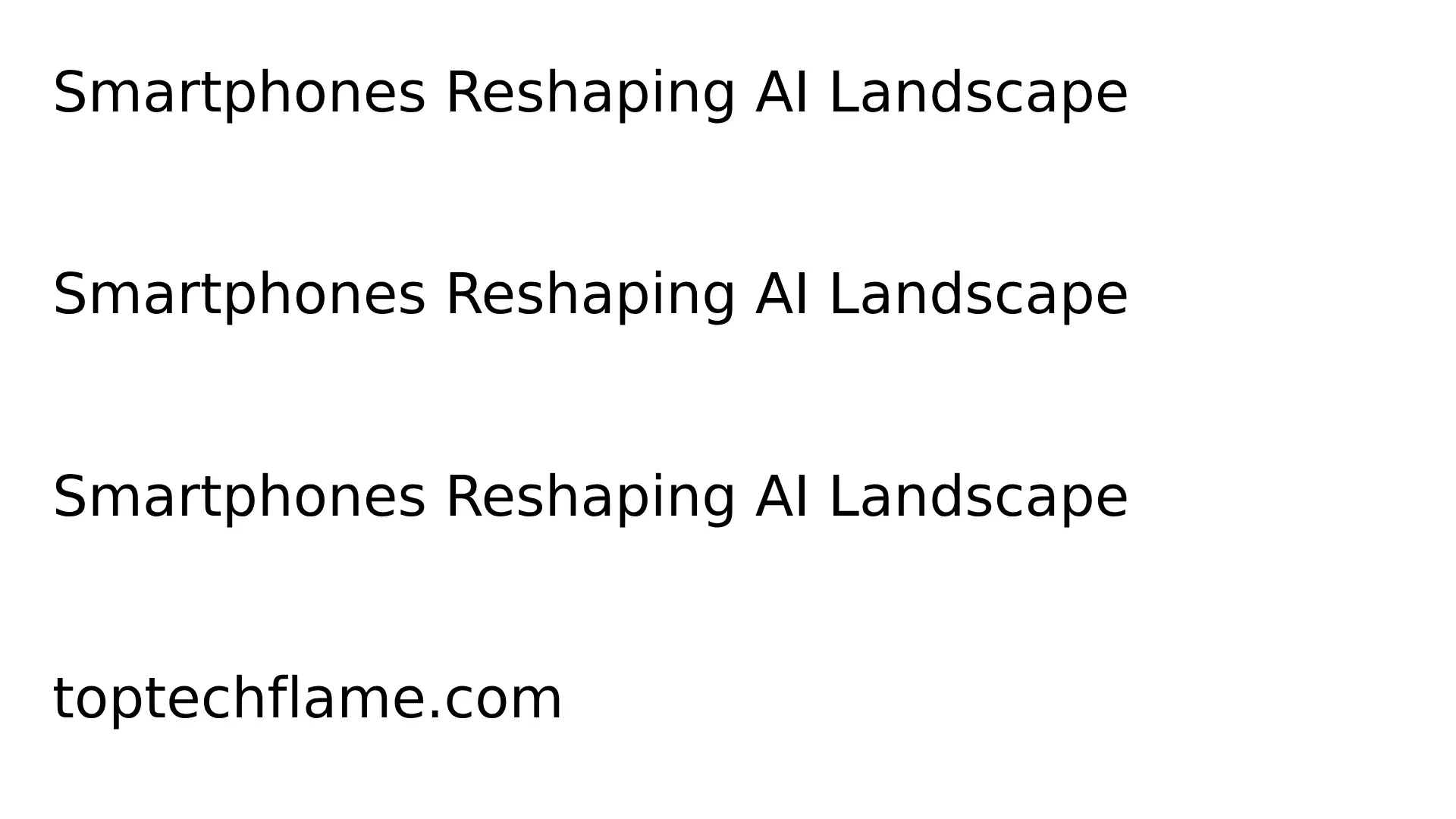Smartphones
Today, Smartphones, brilliant ones, have integrated themselves deeply into our lives and have changed how we exchange information and engage with technology tools. These are one of the essential devices in the world of technology that, with the addition of AI, is changing itself and, with that, the whole world of technology where they become devices that learn from the user and adjust to them. The evolution of these phones is ongoing, and this invention is changing the facial landscape for AI in ways that could not have been imagined a few years back.
How Smartphones Are Driving AI Development
Smartphones are the most significant part of the turn that has taken place in the development of artificial intelligence. The enhanced processing capacity of such devices in recent years has paved the way for AI to become embedded into the core work process. From simple functions such as voice recognition–Siri and Google Home Assistant to sophisticated tasks like image recognition and real-time language translation, AI is built into smartphones and shapes the human experience in every possible way.
AI-Enhanced Smartphones: Changing the Game
These type of phones, once believed to be simple communication devices, are now artificial intelligence machines capable of performing numerous tasks. They can estimate users’ actions, manage time, regulate smart devices, suggest materials, and show them according to user preferences. The two prominent examples here are Google and Apple, which, through AI, have made intelligent mobile devices a core commodity for individuals and businesses alike, where portability and technological advancement converge.
Personalized Experiences Through AI
Smartphones have been made unique through personalization, which AI has made possible like never before. Such apps and services obtain and analyze information to anticipate client requirements and enhance the functionality of these devices. These allow AI-based algorithms to choose their feed, search results, or the content of a shopping list, making them very user-friendly. This customization helps improve the user experience and thus keeps the user busy.

Enhancing Phone Photography with AI
The most obvious area of these phones applications is using artificial intelligence in cameras. Algorithms equipped with AI can now take high-quality images, control lighting, identify objects, and beautify faces. The camera of these phones has been developed with an artificial intelligence backend, making it easier for anyone to take good pictures, like a professional photographer. This is well seen in processes such as portrait mode and night shooting.
Language Translation and Real-Time Assistance
Communication is no longer due to the invention of intelligent applications powered by artificial intelligence that offer translations in multiple languages. Apps include Translate, which enables users to translate texts and voices in real time, even without the Internet. It is a significant improvement, especially in the communication ability of the traveler or professional who transacts in different languages. The use of AI makes the communication process smooth and hassle-free, and it guarantees that the translations provided are correct and appropriate for the given situations.
AI in Voice Assistants
Intelligent voice assistants, such as Siri on Apple devices or Google Assistant and Alexa on home devices, have now become standard features and have altered how users interface with their devices. These virtual assistants are built with artificial intelligence that incorporates natural language processing; hence, users can create a message, a reminder, or a search without typing a thing. Social integration between AI and smartphones enables smartphones to be compatible with the user to the extent that they are easy to handle.
AI-Powered Security
Safety is essential in the present world, and as the results have shown, AI has made our smartphones more secure. Smartphones can detect threats and potential security breaches using a user’s pattern. Applications such as face recognition or fingerprint scanners are AI-based, meaning personal data contains additional protection elements. Besides, AI can also notify the user of any suspicious activities, which will help in protecting information.
The Role of AI in Smartphone App Development
AI is also changing the way that developers develop applications for Smartphones. Subtopics—With the help of AI tools, it is possible to create applications that interact with users’ actions in real-time. This improves the usability of the apps, resulting in better app designs and more efficient performance. AI also includes the possibility of developing apps that can be known and adapted for the user, which makes the application more interesting and engaging.
Improving Mobile Connectivity with AI
People can only live with smartphones, especially in communication, and with AI in place, mobile connectivity is improving. AI assists in managing and maximizing the network quality of these networks so that smartphones should have a better connection, even in areas with low network connections. Thus, through real-time analysis, AI can always select between the two networks or even optimize various parameters to offer the best signal to customers.
AI in Smartphone Marketing and Business
Smartphones are also affecting the business environment, especially in the marketing sector. For instance, through AI, companies can gather large quantities of smartphone data that may facilitate understanding clients’ behavior. AI is also utilized in advertising and marketing strategies to reach specific audiences. AI incorporation in smartphones leads to sound marketing decisions and increases customer satisfaction due to the provision of customized content for customers.
Challenges and Concerns of AI in Smartphones
However, specific issues arise concerning the integration of AI in smartphones. One primary concern, therefore, is privacy. When smartphones gather even more information to help us with our individual experiences, the issue of how that information is stored and processed emerges. Consumers are also becoming increasingly conscious about privacy and protecting their information.
The other inherent problem is the ethicality of intelligent systems’ decisions. For instance, features such as deep fake technology that allows AI to fine-tune images and videos raise concern over their application. It is, therefore, critical to ensure that the use of AI in smartphones, particularly in a fashion that is not harmful to the users, is maintained to retain public trust.
The Future of AI in Smartphones
The future use of AI in Smarsmartphoneseven is even more apparent; the future is bright for integrating smartphones. The future will see smartphone devices doing even more complex tasks as processing power rises and algorithm techniques in machine learning advance. New changes in future AI applications include health monitoring, better voice recognition systems, and compatibility with other smart gadgets.
One is the use of AI integration with features such as augmented reality (AR) on smartphones. AR experiences based on AI technology are already applied in the gaming and entertainment industries but can be helpful in other spheres, such as education, healthcare, and commercial.
Artificial intelligence and The Internet of Things
The combination of AI and IoT is another major trend that will majorly influence the smartphone landscape. Smartphone devices are at the core of intelligent systems as they can command anything ranging from the lighting in the home to the security. AI makes smartphones interact with other IoT; it provides a good solution whereby one can access various devices within an IoT from one interface.
Smartphones as Tools for AI Research
Smartphones are not only consumers of AI but are also a platform for the development of AI. Smartphone data utilization also leads commonly to the training of AI models. For example, data such as consumers’ behavior on their smartphones, how they speak, and image recognition on these gadgets prove very useful in enhancing the performance of AI systems. It means that smartphones have a close relationship with AI research, and both have been fueling the development of each other.
AI and 5G Smartphones
As the new 5G technology is being rolled over the Smartphone’s current and subsequent generations, AI is set to become deeply rooted in smartphones. 5G connections are faster and more reliable than the previous versions, and the performance of AI applications is based on them. This new practitioner’s level of connectivity directly means that the AI features of the devices gain the ability to work much faster and consequently offer the real-time processing of big data. The advancement of 5G technologies worldwide means the potential of artificial intelligence in the Smartphone is set to grow.
Conclusion
It all goes back to smartphones, which are the epitome of AI and are continuously changing with the development of technology. Talking about the opportunities, one cannot help mentioning that AI has improved the functionality of smartphones and made them personal helpers in people’s daily routines. However, as technologies advance, the combination of smartphones with AI will progressively become vital and transform the capabilities of those gadgets. There are still some issues, such as privacy and ethical dilemmas, but there seems to be a promising future for AI in Smartphones, which would make them smarter, wiser, and more efficient tools in our everyday lives.


